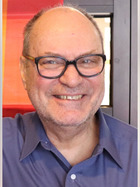
Ric is a retired CPA, who previously worked in the nonprofit industry. He’s divorced and currently single, with two kids and four grandkids. He also has a killer, often self-deprecating sense of humor. When asked to describe himself, he doesn’t hesitate – “Old, bald and fat. Are you sure you want a picture of me on your website?”
Ric was diagnosed with bladder cancer in 2013, after he began noticing blood in his urine. “When the doctor said the word ‘cancer,’ I froze,” Ric recalls. “My face went white. I wish I was with someone because I don’t remember what happened after that.”
He wanted to begin treatment as soon as possible. “We decided right then and there on the course of treatment,” he says. “I didn’t want a second opinion, because I didn’t want to waste any time!” Soon after, he began a course of chemotherapy, followed by surgery.
For many cancer survivors, the effects of a cancer diagnosis don’t entirely disappear after treatment ends. This was the case with Ric. After surgery, he began experiencing problems as a result of his bladder reconstruction. He joined a support group “out of desperation,” hoping that a fellow survivor could give him advice. However, no one else in the support group had had the same procedure, or knew what to do to help.
There was another problem, too: “In a group with straight people, I didn’t feel comfortable sharing myself as a gay person,” Ric says. “A lot of people assume that there’s no distinction between the needs of straight people and gay people, but there is. For example, many straight people can rely upon caretakers, kids or family. Gay men often have less of that support system.”
A hospital social worker referred Ric to CancerCare’s support group for older gay male cancer survivors, offered in partnership with SAGE. “Even at the first group meeting, the members that were there made me feel very comfortable,” Ric says. “Everyone got it.”
Another support group member encouraged Ric to get a second opinion and offered to put him in touch with a surgeon. All of a sudden, something clicked. “All he had to say to me was ‘Go to a different doctor!’ It was so simple, but it never occurred to me.”
A second surgery ended up fixing the problem. Based on his experience, Ric now urges other patients seek a second opinion, and to speak up if they disagree with their health care team. “Doctors are not gods. They’re people. They make mistakes. Listen to your doctor, but don’t be afraid to challenge them. If something doesn’t sound right, then it probably isn’t right.”
He also strongly believes in the importance of peer support. He tells other patients: “You’re not alone. There are people out there who’ve been through this before. No matter what you’re facing, there’s someone who’s been through it already, and you need to seek those people out. Sometimes family understands, but sometimes they don’t. The best support is someone who has gone through it.”
That’s why four years later, Ric still attends a weekly support group at CancerCare. He sees it as a way to help others, in the same way that others once helped him. “I like to share my knowledge with other people,” he says, “to help them along in the ridiculous journey we call life.”
